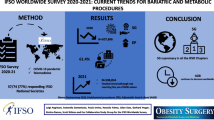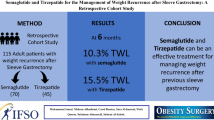Abstract
Purpose
Bariatric surgery is the most effective treatment for severe obesity, but currently, only 1–2% of all eligible patients undergo surgery each year. This study examined which factors were associated with a patient receiving bariatric surgery after referral in a real-world healthcare setting.
Materials and Methods
The current study used the baseline survey and electronic medical record (EMR) data from the Bariatric Experience Long Term (BELONG) study (n = 1975). Predictors of who did (n = 1680) and who did not (n = 295) have surgery were analyzed using multivariate logistic regression.
Results
Participants (n = 1975; 42.4% response rate) were primarily women (84%) and either non-Hispanic Black or Hispanic (60%). In the fully adjusted multivariate model, the strongest predictors of having surgery were being a woman (OR = 3.17; 95% CI = 2.15, 4.68; p < .001) and losing at least 5% of their body weight in the year before surgery (OR = 3.16; 95% CI = 2.28, 4.38; p < .001). The strongest predictors of not having surgery were a ≥ BMI 50 kg/m2 (OR = .39; 95% CI = .27, .56; p < .001) and having a higher physical comorbidity burden (OR = .84; 95% CI = .75, .94; p = .004).
Conclusions
Practices such as 5–10% total weight loss before surgery and selection of patients with safer operative risk profiles (younger with lower comorbidity burden) may inadvertently contribute to under-utilization of bariatric surgery among some demographic subpopulations who could most benefit from this intervention.

Similar content being viewed by others
References
Bhogal SK, Reddigan JI, Rotstein OD, et al. Inequity to the utilization of bariatric surgery: a systematic review and meta-analysis. Obes Surg. 2015;25:888–99.
Martin M, Beekley A, Kjorstad R, et al. Socioeconomic disparities in eligibility and access to bariatric surgery: a national population-based analysis. Surg Obes Relat Dis. 2010;6:8–15.
Al-Sumaih I, Nguyen N, Donnelly M, et al. Ethnic disparities in use of bariatric surgery in the USA: the experience of Native Americans. Obes Surg. 2020;30:2612–9.
Smith ED, Layden BT, Hassan C, et al. Surgical treatment of obesity in Latinos and African Americans: future directions. Bariatr Surg Pract Patient Care. 2018;13:2–11.
Cohn I, Raman J, Sui Z. Patient motivations and expectations prior to bariatric surgery: a qualitative systematic review. Obes Rev. 2019;20:1608–18.
Funk LM, Jolles S, Fischer LE, et al. Patient and referring practitioner characteristics associated with the likelihood of undergoing bariatric surgery: a systematic review. JAMA Surg. 2015;150:999–1005.
Lynch CS, Chang JC, Ford AF, et al. Obese African-American women’s perspectives on weight loss and bariatric surgery. J Gen Intern Med. 2007;22:908–14.
Trainer S, Benjamin T. Elective surgery to save my life: rethinking the “choice” in bariatric surgery. J Adv Nurs. 2017;73:894–904.
Stolberg CR, Hepp N, Juhl AJA, et al. Primary care physician decision making regarding referral for bariatric surgery: a national survey. Surg Obes Relat Dis. 2017;13:807–13.
Lopez EKH, Helm MC, Gould JC, et al. Primary care providers’ attitudes and knowledge of bariatric surgery. Surg Endosc. 2020;34:2273–8.
Wallace AE, Young-Xu Y, Hartley D, et al. Racial, socioeconomic, and rural-urban disparities in obesity-related bariatric surgery. Obes Surg. 2010;20:1354–60.
Wee CC, Huskey KW, Bolcic-Jankovic D, et al. Sex, race, and consideration of bariatric surgery among primary care patients with moderate to severe obesity. J Gen Intern Med. 2014;29:68–75.
Stewart F, Avenell A. Behavioural interventions for severe obesity before and/or after bariatric surgery: a systematic review and meta-analysis. Obes Surg. 2016;26:1203–14.
Wykowski K, Krouse HJ. Self-care predictors for success post-bariatric surgery: a literature review. Gastroenterol Nurs. 2013;36:129–35.
Livhits M, Mercado C, Yermilov I, et al. Does weight loss immediately before bariatric surgery improve outcomes: a systematic review. Surg Obes Relat Dis. 2009;5:713–21.
Toussi R, Fujioka K, Coleman KJ. Pre- and post-surgery behavioral compliance, patient health, and post-bariatric surgical weight loss. Obesity. 2009;17:996–1002.
Mitchell JE, King WC, Chen JY, et al. Course of depressive symptoms and treatment in the longitudinal assessment of bariatric surgery (LABS-2) study. Obesity. 2014;22:1799–806.
Livhits M, Mercado C, Yermilov I, et al. Preoperative predictors of weight loss following bariatric surgery: systematic review. Obes Surg. 2012;22:70–89.
van Hout GC, Verschure SK, van Heck GL. Psychosocial predictors of success following bariatric surgery. Obes Surg. 2005;15:552–60.
Livhits M, Mercado C, Yermilov I, et al. Exercise following bariatric surgery: systematic review. Obes Surg. 2010;20:657–65.
Sheets CS, Peat CM, Berg KC, et al. Post-operative psychosocial predictors of outcome in bariatric surgery. Obes Surg. 2015;25:330–45.
Clark SM, Saules KK, Schuh LM, et al. Associations between relationship stability, relationship quality, and weight loss outcomes among bariatric surgery patients. Eat Behav. 2014;15:670–2.
Livhits M, Mercado C, Yermilov I, et al. Patient behaviors associated with weight regain after laparoscopic gastric bypass. Obes Res Clin Pract. 2011;5:e169–266.
Livhits M, Mercado C, Yermilov I, et al. Is social support associated with greater weight loss after bariatric surgery? A systematic review. Obes Rev. 2011;12:142–8.
National Institutes of Health. Potential Candidates for Bariatric Surgery. https://www.niddk.nih.gov/health-information/weight-management/bariatric-surgery/potential-candidates. Accessed on July 30, 2020.
Memarian E, Calling S, Sundquist K, et al. Sociodemographic differences and time trends of bariatric surgery in Sweden 1990-2010. Obes Surg. 2014;24:2109–16.
Mainous AG, Johnson SP, Saxena SK, et al. Inpatient bariatric surgery among eligible black and white men and women in the United States, 1999-2010. Am J Gastroenterol. 2013;108:1218–23.
Shaw KM, Handler J, Wall HK, et al. Improving blood pressure control in a large multiethnic California population through changes in health care delivery, 2004-2012. Prev Chronic Dis. 2014;11:E191.
Sim JJ, Handler J, Jacobsen SJ, et al. Systematic implementation strategies to improve hypertension: the Kaiser Permanente Southern California experience. Can J Cardiol. 2014;30:544–52.
Kanter MH, Abrams KM, Carrasco MR, et al. Patient-physician language concordance: a strategy for meeting the needs of Spanish-speaking patients in primary care. Perm J. 2009;13:79–84.
Gerber P, Anderin C, Thorell A. Weight loss prior to bariatric surgery: an updated review of the literature. Scand J Surg. 2015;104:33–9.
Benotti PN, Still CD, Wood GC, et al. Preoperative weight loss before bariatric surgery. Arch Surg. 2009;144:1150–5.
Blackledge C, Graham LA, Gullick AA, et al. Outcomes associated with preoperative weight loss after laparoscopic Roux-en-Y gastric bypass. Surg Endosc. 2016;30:5077–83.
Tewksbury C, Williams NN, Dumon KR, et al. Preoperative medical weight management in bariatric surgery: a review and reconsideration. Obes Surg. 2017;27:208–14.
Arterburn D, Johnson ES, Butler MG, et al. Predicting 90-day mortality after bariatric surgery: an independent, external validation of the OS-MRS prognostic risk score. Surg Obes Relat Dis. 2014;10:774–9.
Adams TD, Mehta TS, Davidson LE, et al. All-cause and cause-specific mortality associated with bariatric surgery: a review. Curr Atheroscler Rep. 2015;17:74.
Courcoulas A, Coley RY, Clark J, et al. Long-term safety outcomes after bariatric surgery in a national cohort: the PCORnet bariatric study. JAMA Surg. 2020;155:194. https://doi.org/10.1001/jamasurg.2019.5470.
Casillas RA, Kim B, Fischer H, et al. Comparative effectiveness of sleeve gastrectomy versus Roux-en-Y gastric bypass for weight loss and safety outcomes in older adults. Surg Obes Relat Dis. 2017;13:1476–83.
Mitchell JE, Christian NJ, Flum DR, et al. Postoperative behavioral variables and weight change 3 years after bariatric surgery. JAMA Surg. 2016;151:752–7.
Weinstein AL, Marascalchi BJ, Spiegel MA, et al. Patient preferences and bariatric surgery procedure selection; the need for shared decision-making. Obes Surg. 2014;24:1933–9.
Acknowledgments
The authors would like to thank the patients who participated in this study without whom the study could not have been done.
Funding
This work was funded by an award from the National Institute of Diabetes and Digestive and Kidney Diseases (NIDDK) #R01DK108522.
Author information
Authors and Affiliations
Corresponding author
Ethics declarations
Conflict of Interest
The authors declare that they have no conflict of interest.
Ethical Approval
All procedures performed in studies involving human participants were in accordance with the ethical standards of the institutional and/or national research committee and with the 1964 Helsinki declaration and its later amendments or comparable ethical standards.
Informed Consent
The Kaiser Permanente Southern California institutional review board (IRB) for human subjects approved all study procedures and waived the requirement for signed informed consent; however, all participants provided informed consent for the study during the phone and email/web-based recruitment for the study. The IRB also approved using the EMR to determine eligibility without obtaining consent.
Additional information
Publisher’s Note
Springer Nature remains neutral with regard to jurisdictional claims in published maps and institutional affiliations.
Electronic supplementary material
ESM 1
(DOCX 43.4 kb)
Rights and permissions
About this article
Cite this article
Moore, D.D., Arterburn, D.E., Bai, Y. et al. The Bariatric Experience Long Term (BELONG): Factors Related to Having Bariatric Surgery in a Large Integrated Healthcare System. OBES SURG 31, 847–853 (2021). https://doi.org/10.1007/s11695-020-05045-7
Received:
Revised:
Accepted:
Published:
Issue Date:
DOI: https://doi.org/10.1007/s11695-020-05045-7




